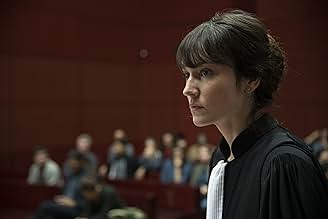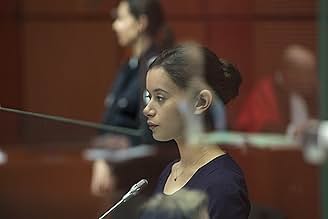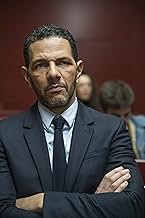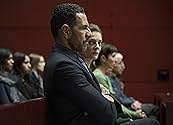La fille au bracelet
- 2019
- Tous publics
- 1h 35min
NOTE IMDb
6,6/10
2,6 k
MA NOTE
Une adolescente est jugée pour le meurtre de sa meilleure amie.Une adolescente est jugée pour le meurtre de sa meilleure amie.Une adolescente est jugée pour le meurtre de sa meilleure amie.
- Réalisation
- Scénario
- Casting principal
- Récompenses
- 3 victoires et 5 nominations au total
Pascal Garbarini
- Le Président du Tribunal
- (as Pascal-Pierre Garbarini)
Avis à la une
The French court drama 'La fille au bracelet' (the English title is 'The Girl with a Bracelet') made in 2019 by Stéphane Demoustier starts from a situation that is one of the nightmares of any parent. How do a couple of parents face the fact that their daughter, just out of adolescence, is accused of a horrible crime, the murder of her best friend? Can family, marriage hold? Can parents cope with doubts about their daughter's possible guilt and remorses over the fact that from one point on they can no longer protect her in the face of the justice machine? 'La fille au bracelet' which adapts and relocates an Argentine film (which I have not seen) treats this topic with discretion and sensitivity.
The opening scene of the film looks like a copy of the scene that opens the Romanian film ' Arest' by Andrei Cohn that I saw recently. The scene takes place on a beach, is filmed from afar in one shot. A family spends a quiet afternoon by the sea. The police appear, snatching one of the people from normal life in order to throw her into a completely different reality, in prison. From here on the two films are different. The arrested person is Lise, a 16-year-old teenager ( Melissa Guers), the daughter of a middle-class couple (Roschdy Zem, Chiara Mastroianni). The family's life turns into a Kafka-esque nightmare, being confronted with the girl's pre-trial detention for six months followed by a legal procedure that after two years leads to the trial in which Lise is accused of murder. Most of the film takes place in the courtroom. However, more questions about the morality of the accused seem to be put before the court than evidence to prove guilt. The girl's lack of communication does not help her face the accusator, the judge and the jurors. Is this the natural shock that a teenager torn from normal life and thrown into legal proceedings under a terrible accusation goes through, or maybe it is a proof of guilt? Doubts sneak even into the minds of the parents.
I liked the approach of director Stéphane Demoustier. He films the court scenes as a TV broadcast, a neutral-style justice drama. Even the scenes that take place between the parents, or between the parents, the girl and her brother are devoid of sentimentality and do not give explicit answers to all the questions. Precisely due to the director's objectivity, the spectators, like the jurors of the trial, can form their own opinions. Perhaps the lawyer's plea contains the key to watching the film: how much do we understand, parents and grown-up people, of the problems and feelings of young people, how much do we remember and how much did we forget about how we were at their age? Minimalism also characterises the way actors are directed. Melissa Guers as Lisa makes an exceptional debut which is hopefully the beginning of a formidable career. Roschdy Zem and Chiara Mastroianni are very well cast in the roles of parents, reserved and keeping their troubles inside. Anaïs Demoustier (the director's sister) also appears in this film in a very different role from the one in 'Alice et le maire' in which I liked her enormously. I even wondered while watching what the heroine there would have thought about this prosecutor who seems to be trying to convict a young woman of murder without concrete evidence, practically asking the accused to prove her innocence instead of her, the prosecutor proving the guilt beyond of any doubt, as required by the laws of justice. 'La fille au bracelet' is the kind of movie that is sometimes said to resemble a long episode of a TV series. In this case, however, it is much more, it is a court drama with a story and characters that accompany the viewers long after the screening of the film is over.
The opening scene of the film looks like a copy of the scene that opens the Romanian film ' Arest' by Andrei Cohn that I saw recently. The scene takes place on a beach, is filmed from afar in one shot. A family spends a quiet afternoon by the sea. The police appear, snatching one of the people from normal life in order to throw her into a completely different reality, in prison. From here on the two films are different. The arrested person is Lise, a 16-year-old teenager ( Melissa Guers), the daughter of a middle-class couple (Roschdy Zem, Chiara Mastroianni). The family's life turns into a Kafka-esque nightmare, being confronted with the girl's pre-trial detention for six months followed by a legal procedure that after two years leads to the trial in which Lise is accused of murder. Most of the film takes place in the courtroom. However, more questions about the morality of the accused seem to be put before the court than evidence to prove guilt. The girl's lack of communication does not help her face the accusator, the judge and the jurors. Is this the natural shock that a teenager torn from normal life and thrown into legal proceedings under a terrible accusation goes through, or maybe it is a proof of guilt? Doubts sneak even into the minds of the parents.
I liked the approach of director Stéphane Demoustier. He films the court scenes as a TV broadcast, a neutral-style justice drama. Even the scenes that take place between the parents, or between the parents, the girl and her brother are devoid of sentimentality and do not give explicit answers to all the questions. Precisely due to the director's objectivity, the spectators, like the jurors of the trial, can form their own opinions. Perhaps the lawyer's plea contains the key to watching the film: how much do we understand, parents and grown-up people, of the problems and feelings of young people, how much do we remember and how much did we forget about how we were at their age? Minimalism also characterises the way actors are directed. Melissa Guers as Lisa makes an exceptional debut which is hopefully the beginning of a formidable career. Roschdy Zem and Chiara Mastroianni are very well cast in the roles of parents, reserved and keeping their troubles inside. Anaïs Demoustier (the director's sister) also appears in this film in a very different role from the one in 'Alice et le maire' in which I liked her enormously. I even wondered while watching what the heroine there would have thought about this prosecutor who seems to be trying to convict a young woman of murder without concrete evidence, practically asking the accused to prove her innocence instead of her, the prosecutor proving the guilt beyond of any doubt, as required by the laws of justice. 'La fille au bracelet' is the kind of movie that is sometimes said to resemble a long episode of a TV series. In this case, however, it is much more, it is a court drama with a story and characters that accompany the viewers long after the screening of the film is over.
Completely free of any dramatic tension, a girl is tried for the murder of her best friend. The difference between an adversarial and inquisitorial justice system makes interpretation of the process a bit challenging but the prosecutor seemed to be saying since you can't prove it wasn't you it must have been you. All the old tropes of "she wasn't a virgin so she must have been a murderer" We've all seen Spiral so we know about investigating magistrates so it's still difficult to understand how this one made it to trial
"La Fille au Bracelet" narrates the final phases of a legal process against Lise Bataille, a young teenager accused of murdering her best friend. The director told the story almost like a documentary, and as a person that watched some courtroom recordings of famous cases, I have to say that the movie was realistic and immersed me in the plot. It also explores the relationship between the girl and her parents that need to go through this difficult and long procedure that will consume them, creating tensions between different family members. The psychology of the main character is very well developed, and she was very consistent for the whole length.
I personally think that there were a few scenes that were very boring and were dragged longer than necessary. Even though I was genuinely curious to see how it ended, I think that Stéphane Demoustier and the cast could have done a better job in order to create more tension and keep the audience more engaged. Probably this has to do with the chosen narration style, which wants to emulate as much as possible the reality, however the acting could have been a bit more dramatic and expressive in my humble opinion. If you like European cinema you should definitely give this a shot. It is overall a solid drama with good characters and nice acting.
I personally think that there were a few scenes that were very boring and were dragged longer than necessary. Even though I was genuinely curious to see how it ended, I think that Stéphane Demoustier and the cast could have done a better job in order to create more tension and keep the audience more engaged. Probably this has to do with the chosen narration style, which wants to emulate as much as possible the reality, however the acting could have been a bit more dramatic and expressive in my humble opinion. If you like European cinema you should definitely give this a shot. It is overall a solid drama with good characters and nice acting.
You need to temper your expectations. This is not a whodunit or a thriller or a suspense. This is not even a courtroom drama for that matter (although it pretends to be one)!!
This is purely a girl and her family's experience when she's accused of murder.
Shows you, that as parents, we know very little about our kids' lives. Which was personally very connecting to me.
I liked the courtroom scenes but I didn't like that prosecutor one bit because she came across as being unprepared for the trial. She just made lots of sensational claims without any basis for them.
Other than that, i loved the mood of the movie throughout.
This is purely a girl and her family's experience when she's accused of murder.
Shows you, that as parents, we know very little about our kids' lives. Which was personally very connecting to me.
I liked the courtroom scenes but I didn't like that prosecutor one bit because she came across as being unprepared for the trial. She just made lots of sensational claims without any basis for them.
Other than that, i loved the mood of the movie throughout.
I usually find with French courtroom dramas a refreshing lack of formality and deference. That's not to say that it's a free for all, but the ebbing and flowing of testimony and barrister intervention seems to me far more likely to facilitate a more accurate verdict. "Lise" (Melissa Guers) has been arraigned on a charge of the murder of her best friend "Flora". She was found stabbed multiple times in a bed they had shared the night before. The prosecutor (Anaïs Demoustier) is alleging that a leaked, intimate, video of "Lise" and their friend "Nathan" (Mikaël Halimi) was the source of the violence but she denies that. As the investigation proceeds, we begin to realise that nothing is simple here. "Lise" turns out to be a sexually active girl and the trial sort of shifts from an evaluation of her guilt and innocence into one of youth, profligacy, morals and behaviour. At that, it's quite provocative and the young Guers delivers well. She portrays the character convincingly, lacking in confidence and emanating quite a genuine sense of bemused bewilderment coupled with a remarkable degree of self-control. It's quite clear that as her parents learn a little more of their daughter's peccadilloes that they, too, have demons to face - and at times you do wonder if her dad "Bruno" (Roschdy Zem) is entirely sure of her innocence. Annie Mercier is also quite effective as the girl's legal counsel presenting a far less confrontational style then the prosecutor and for the bulk of this ninety minutes, we have quite a decent drama that does ask you not just whom you believe, but also - what were you like at that age. The trial itself seems a little weak, but as a vehicle for quite a characterful performance from Guers it's worth watching.
Le saviez-vous
- AnecdotesAnaïs Demoustier, who plays the prosecutor, is the director's sister. Chiara Mastroianni, who plays Lise's mother, is the daughter of Marcello Mastroianni and Catherine Deneuve.
- ConnexionsRemake of Acusada (2018)
Meilleurs choix
Connectez-vous pour évaluer et suivre la liste de favoris afin de recevoir des recommandations personnalisées
- How long is The Girl with a Bracelet?Alimenté par Alexa
Détails
- Date de sortie
- Pays d’origine
- Site officiel
- Langue
- Aussi connu sous le nom de
- The Girl with a Bracelet
- Lieux de tournage
- Palais de justice, Nantes, Loire-Atlantique, France(courthouse exterior and interior locations)
- Sociétés de production
- Voir plus de crédits d'entreprise sur IMDbPro
Box-office
- Budget
- 3 300 000 € (estimé)
- Montant brut mondial
- 2 593 818 $US
- Durée1 heure 35 minutes
- Couleur
- Rapport de forme
- 1.66 : 1
Contribuer à cette page
Suggérer une modification ou ajouter du contenu manquant


![Regarder Bande-annonce [VO]](https://m.media-amazon.com/images/M/MV5BZTBlZWVmZGMtZGJlZi00OWEwLTgzM2ItM2E4ZTIwNWUxNzUxXkEyXkFqcGdeQXRyYW5zY29kZS13b3JrZmxvdw@@._V1_QL75_UX500_CR0)
























